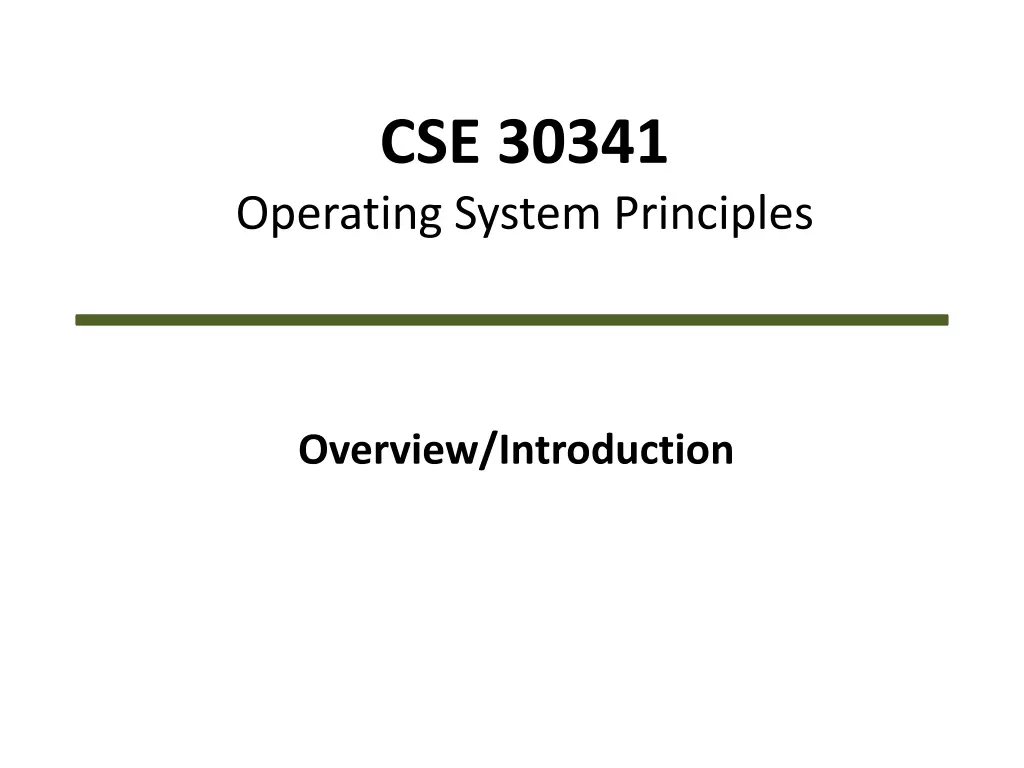
Operating System Principles Overview and Introduction
Explore the foundational principles of operating systems in CSE 30341. Learn about the structure of computer systems, the role of operating systems, and the goals they aim to achieve. Dive into topics such as project work, grading criteria, and collaboration policies. Discover the essential components of operating systems and their significance in making computer systems efficient and user-friendly.
Uploaded on | 0 Views
Download Presentation

Please find below an Image/Link to download the presentation.
The content on the website is provided AS IS for your information and personal use only. It may not be sold, licensed, or shared on other websites without obtaining consent from the author. If you encounter any issues during the download, it is possible that the publisher has removed the file from their server.
You are allowed to download the files provided on this website for personal or commercial use, subject to the condition that they are used lawfully. All files are the property of their respective owners.
The content on the website is provided AS IS for your information and personal use only. It may not be sold, licensed, or shared on other websites without obtaining consent from the author.
E N D
Presentation Transcript
CSE 30341 Operating System Principles Overview/Introduction
Syllabus Instructor: Christian Poellabauer (cpoellab@nd.edu) Course Meetings TR 9:30 10:45 DeBartolo 101 TAs: Jian Yang, Josh Siva, Qiyu Zhi, Louis Daudet (office hours & locations will be announced) Office Hours Tuesday 12-1 & Thursday 11-12 or send email Course web site, announcements CSE 30341 Operating System Principles 2
Textbook Course Textbook (not required) Any revision (7-9) will be fine Kernigan / Ritchie for C Programming is optional CSE 30341 Operating System Principles 3
Grading Projects Exam 1 Exam 2 Final Exam 50% 15% 15% 20% Fixed grading scale: A A- B+ B B- 90-100 88-90 86-88 76-86 74-76 C+ C C- D F 72-74 62-72 60-62 50-60 < 50 OR < 40 Projects OR < 40 Exams CSE 30341 Operating System Principles 4
Projects Done individually Four projects Multiple weeks each May have evaluation component Linux computers Fitzpatrick Stinson/Remick Collaboration/Honor Policy CSE 30341 Operating System Principles 5
What is an Operating System? A program that acts as an intermediary between a user of a computer and the computer hardware Operating system goals Execute user programs Make the computer system convenient to use Use the computer hardware in an efficient manner Hide complexities from user ( layer of abstraction ) CSE 30341 Operating System Principles 6
Computer System Structure Four components Hardware provides basic computing resources CPU, memory, I/O devices Operating system Controls and coordinates use of hardware among various applications and users Application programs Word processors, compilers, web browsers, database systems, video games Users People, machines, other computers CSE 30341 Operating System Principles 7
Computer System Structure CSE 30341 Operating System Principles 8
What is an OS? (System View) OS is a resource allocator Manages all resources Decides between conflicting requests for efficient and fair resource use OS is a control program Controls execution of programs to prevent errors and improper use of the computer CSE 30341 Operating System Principles 9
What is an OS? (User View) Users want convenience, easeofuse, performance, Don t really care about details of how applications are executed Users needs may depend on type of computer: Shared computer Mainframes, any kind of centralized computing systems Am I getting my fair share? Dedicated computer (workstation, PC, laptop) Do I get good performance? Is it easy to use? Mobile devices (smartphones, etc.) Do I get good performance? Will my battery last? Embedded systems Does it work correctly? Is it predictable? (Do we even need an OS?) CSE 30341 Operating System Principles 10
What Is Inside An OS? No universally accepted definition One extreme: Everything a vendor ships when you order an operating system (everything on the CD/DVD) Another extreme: Minimum necessary functionality (e.g., the kernel ) Kernel: the one program running at all times on the computer (without it, you wouldn t have an OS) Everything else is either a system program (ships with the operating system) or an application program (bought, downloaded, programmed, ) CSE 30341 Operating System Principles 11
What Is Inside An OS? Inside kernel: essential parts CPU scheduler, memory manager, interrupt controller, etc. Outside kernel: non-essential parts File management commands, user management & access right commands, performance tools, debugging, compilers, CSE 30341 Operating System Principles 12
Summary Glue between hardware and user space User space: application-level, using an OS Kernel space: within the operating system User perspective: provide a layer of abstraction; convenience, ease-of-use, etc. System perspective: manage/control limited resources, efficiency, support multiple users/application Kernel (essential parts) + systems programs CSE 30341 Operating System Principles 13
Computer System Organization One or more CPUs, device controllers connect through common bus providing access to shared memory Concurrent execution of CPUs and devices competing for memory, bus, etc. CSE 30341 Operating System Principles 14
Computer Startup Bootstrap program is loaded at power-up or reboot Typically stored in ROM or EPROM, generally known as firmware Initializes all aspects of system Loads operating system kernel and starts execution (Unix: 1st process = swapper/sched, 2nd process = init) CSE 30341 Operating System Principles 15
BIOS Basic Input / Output System CSE 30341 Operating System Principles 16
CPU & I/O I/O devices and the CPU can execute concurrently Multiple things going on at once How? Each device has its own controller ( mini CPU ) Each controller responsible for particular device type Each controller has some local memory (buffer) Need way to move data CPU moves data from/to main memory to/from local buffers I/O is from the device to local buffer of controller Device controller needs to informs CPU that it has finished its operation CSE 30341 Operating System Principles 17
Polling vs. Interrupts Think of a set of devices Polling Are you done? Are you done? Are you done? Are you done? Interrupt I need HELP! CSE 30341 Operating System Principles 18
Common Functions of Interrupts Interrupt occurs Transfer to interrupt service routine (ISR) Interruptvector Addresses of the service routines Save & come back Stop our current assembly instruction Come back to resume after we are done (remember where!) Multiple types of interrupts Hardware interrupts Trap or exception -> software-generated interrupt Errors or user requests An operating system is interrupt driven! CSE 30341 Operating System Principles 19
Interrupt Handling The operating system preserves the state of the CPU by storing registers and the program counter Incoming interrupts are disabled (prevent lost interrupts) Which device? Polling (no identity known) Vectored (sends identity along) Separate segments of code determine what action should be taken for each type of interrupt CSE 30341 Operating System Principles 20
Interrupt Timeline ISR ISR HELP! HELP! CSE 30341 Operating System Principles 21
Lecture Wrap Up Key Points What is an operating system? What is a kernel? What is an interrupt and how does it work? CSE 30341 Operating System Principles 22






















